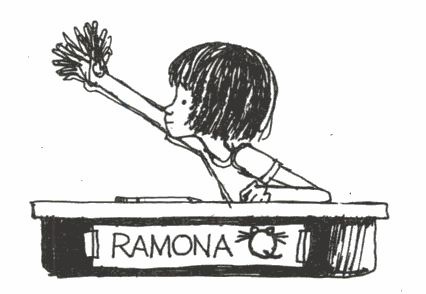To me, the strongest evidence of “girls’ stories are for girls; boys’ stories are universal” has been that Beverly Cleary doesn’t have more adaptations to her credit. Oh, true, there are not to my knowledge any adaptations of Henry Huggins, even though those books actually came first and Ramona’s story is a spin-off. But Ramona has long enjoyed more popularity, and so far as I know her only appearances have been a 1988 TV series starring Sarah Polley and an almost forgotten 2010 movie.
When we first meet Ramona, she’s an obnoxious preschool kid who follows Henry around and gets in the way. Then in the first book in the series, Ramona and Beezus, we see Beezus—Ramona couldn’t pronounce Beatrice, and the nickname stuck—deal with how infuriating she finds her younger sister. Over the course of seven more books, Ramona enters kindergarten, deals with teachers, handles her parents’ relationship stresses, becomes a big sister, and grows into her own skin.
The books are set in a fairly timeless suburbia, and indeed many of Ramona’s problems are universal. She doesn’t always get along with her sister. She worries that her teachers don’t like her. She’s afraid when her parents fight. She has a day where everything seems to go wrong. She has been the bratty kid and learns how to deal with a different bratty kid. She wants both the privileges of being older and the privileges of being a little kid, and she has a hard time dealing with the fact that you can’t have both. She is intelligent and determined and annoying, all at once.
Ramona’s inner life is populated with all sorts of figures, often from TV. In a heartbreaking installment where she and Beezus bury the family cat, Picky-picky, rather than make their parents deal with the problem, Ramona projects everything she’s seen about TV funerals onto the experience. Her “we were digging a little grave” response to her parents when they ask what happened to Beezus’s hands is sincere, yes, but at the same time a clear indicator of Ramona’s dramatic personality. She knows how pathetic it sounds and—though she herself would be shocked if you told her that—frankly revels in it even through her grief.
Honestly, the only thing that’s ever bothered me about the series is all the comparisons between her and Willa Jean, her friend Howie’s younger sister. It’s true that she’s fairly obnoxious in the earlier books, especially the ones where we don’t see inside her head and see how hard she’s trying to be good. But Ramona’s right when she observes that she herself never would’ve cut off a stuffed bear’s leg to see what it was made of. The fact is, Willa Jean is spoiled, and Ramona never was. Maybe her parents didn’t always handle what she did in the best way, but they also never blamed Beezus for her shortcomings the way Howie’s grandmother blames Ramona for Willa Jean’s. Ramona’s right. It’s not fair. The fact that things in her life aren’t fair, though, is one more way for the readers to connect to Ramona.
Help me afford the last couple of books I don’t own in the series; consider supporting my Patreon or Ko-fi!

